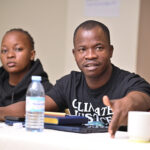This article was published more than 6 years ago.
With its fertile land and lengthy coastline along Lake Albert, western Uganda’s Hoima District is brimming with natural resources. For generations, the bulk of the region’s population has sustained itself through fishing and agriculture—pulling in net after net of Nile perch and tilapia, and growing crops like cassava, mangoes, and bananas.
But since the discovery of oil in Hoima in 2006, the lives and livelihoods of Hoima’s more than 570,000 inhabitants have come under increasing threat.
The National Association of Professional Environmentalists (NAPE) is responding to this threat with programs aimed at educating communities on their natural resource rights, improving their food security, and helping them advocate for their rights with government officials. At the center of this work is NAPE’s Sustainability School, which trains community leaders on Ugandan law, sustainable farming methods, and organizing techniques.
The Fund for Global Human Rights has been supporting NAPE since 2010. This photo essay tells the story of two Hoima communities benefiting from their Sustainability School: Butimba and Kigaaga.

Lured by the revenue oil can bring and the development it can drive, government officials, international investors, and corporate representatives have flocked to Hoima District since the lucrative resource was discovered there in 2006. Initial drilling to assess the quality of the oil has been completed, roads have been built, and the locations of a future airport and oil refinery have been identified. If all goes as planned, oil production is expected to begin in 2020.

Encouraged by funders to invest in oil and other large-scale development projects, the government of Uganda has made these projects the basis of its strategy for overcoming poverty. But according to Allan Kalangi of the National Association of Environmental Professionals (NAPE), while this strategy could bring some benefits to the country’s overall economy, it ignores the impact mega-development projects have on rural communities who depend on local land and waterways to survive. In the case of oil exploration in Hoima, that impact has already included the uprooting of thousands of people from their homes, which has in turn led to increased food insecurity, unemployment, and gaps in children’s education.

Witnessing the negative impacts mega-development projects were having on rural communities, in 2009 NAPE launched its Sustainability School. According to Allan, who manages the project, “We realized we needed to come up with a program to empower…communities to protect their rights, organize themselves, and also start their own [local-level] development agendas.” Nine years later, the school supports 24 ‘Sustainability Villages’ in seven Uganda districts—including oil-rich Hoima.

Reverend Fred Musimenta was one of the first community educators trained by NAPE’s Sustainability School in Hoima. His community, Butimba. is near the site of the future oil refinery, from which thousands of people were displaced. Butimba residents hosted many of the evicted families, straining the community’s food reserves. “We had to share food, we did not want them to starve,” he said.

Armed with the knowledge they gained at the Sustainability School, Reverend Fred and a fellow community educator were able to teach their neighbors how to diversify their crops, improve their yields, and implement farming techniques that were more sustainable. The latter includes encouraging people to plant indigenous and traditional seeds, as opposed to genetically modified species brought in from abroad—and widely promoted by the government. The training helped Butimba residents cope with the influx of displaced families, and prepare for potential future influxes of people—including workers—once the oil refinery is operational.

When asked why it is important to use sustainable farming methods, Reverend Fred said, “The government is interested in fast-growing crops, but these have side effects. The bananas [the government] brings are huge, but…they quickly disappear from your garden, so you have to look for new seeds [in the marketplace].” If communities use indigenous and traditional seeds, they can collect and store them rather than having to purchase them, which is the case with the genetically-modified versions.

Another important lesson Reverend Fred learned through the Sustainability School is the need to preserve and protect the community’s forests. “We had seen a lot of trees had been destroyed… One of the reasons was the effect of the oil refinery. When the oil refinery came, many people moved here and cut trees because they had no jobs.” With a sub-grant from NAPE, his community was able to start a nursery where they plant and nurture seedlings of indigenous trees.

The benefits of Butimba’s nursery go far beyond preventing deforestation. During interviews with Butimba community members, one woman pointed to the fact that the trees will “clean the air” of smoke from the oil refinery, once it is operational. In addition, Reverend Fred said the nursery has had an economic benefit for the community, with nongovernmental organizations (NGOs) and others coming to them to buy seedlings. He said protecting the forest has also prevented firewood scarcities, relieving people—especially women—of the burden of having to walk far distances to find wood.

Another income-generating activity advanced by the Sustainability School—beekeeping—also helps protect the forests and improve the community’s food security and economic situation. “If you’re a beekeeper…you don’t cut trees…you have to keep trees to provide shade for the bees,” explained Reverend Fred. “And beekeeping is a lucrative business, you get money out of it. Just a small bottle [of honey], one liter, can earn you 20,000 Ugandan shillings [about five US dollars].” He said that many Butimba families have built beehives and are earning money from them.

A less obvious benefit of the farming and environmental conservation techniques taught through NAPE’s Sustainability School is their potentially positive impact on land rights—particularly their role in preventing land grabs. Under Ugandan law, the government can seize land in the name of development, but not without fairly compensating or relocating those who live there. If a family is aware of their land rights and, equally important, has used their land wisely, they can demand higher compensation from the government for the loss of land, crops, and trees. Meanwhile, the government, seeking to avoid paying a hefty price tag, will be more likely to look elsewhere for territory.

Peninah Ruhindi is from Kigaaga—a community near Butimba that Reverend Fred introduced to the Sustainability School. She said that before the school came to Kigaaga, “We were just destroying the environment. But when they came and told us we are killing ourselves by [doing that], we started to plant.” Asked what would have happened if NAPE had not come, Peninah replied, “I think we would have started to die because the drought was coming, [and] because of our ignorance. We didn’t know what we were doing.”

Several years since NAPE began working in Kigaaga, Peninah’s fields are rich with potatoes and other crops. A natural-born leader who also serves in local government, Peninah teaches her fellow community members the lessons she learned through the Sustainability School and its affiliated radio program, Community Green Radio. “We love listening to Community Green Radio because we [learn]. We even take the radio to the gardens because we don’t want to miss [it].”

An offshoot of NAPE’s Sustainability School project, Community Green Radio is broadcast from Hoima’s capital—Hoima. The station broadcasts stories from area communities, including those negatively impacted by oil development. It also produces educational programming about land rights, environmental conservation, and other topics relevant to Hoima’s rural population. Broadcast in local languages so that all listeners can follow and understand their programs, the station plays a critical role in updating local people about government and other decisions impacting their lives—including developments related to the oil exploitation.

To reinforce lessons learned on the radio and through the Sustainability School, Sustainability Villages, as they are called, also perform educational skits. The performers are local people from the communities. They use drama and at times, humor, to drive home key messages about land rights, natural resource management, and sustainable agriculture.

One of the biggest advantages of the educational dramas is that they engage people of all ages—including children. Women are also front and center during the skits—and often among the lead performers. According to Reverend Fred, the impact of the Sustainability School and NAPE’s other activities on women have been among the most significant. “Since we started with NAPE in 2010, the communities have really seen a lot of change….For one, people have understood their human rights—especially women…The voices of the voiceless have come out.”

The involvement of women in the Sustainability School is critical given that they are often the ones most heavily impacted by land grabbing and food insecurity. For example, when the government or other stakeholders negotiate a price for a family’s land, the man often leads the discussion—then takes the money and runs, leaving the wife and children behind to struggle. But with training from the Sustainability School, women like Mary Tugumisirize (pictured) are playing powerful roles in their families and communities. “My husband feels proud of someone who speaks out,” said Mary, who has learned not only about improved farming techniques and her land rights, but also about her rights as a woman.

Even before NAPE brought the Sustainability School to Butimba and Kigaaga, women like Mary and her friend, Ruth Kasimba (pictured), were pushing their communities to protect the environment. Ruth had seen the impact of deforestation in the community where she grew up, including the shortage of firewood it caused. When she saw it happening in Butimba, she rallied Mary and several other women to form a community group to discuss it. That group was eventually trained by the Sustainability School.

The associations NAPE has helped build in Butimba, Kigagga, and other Ugandan towns through its Sustainability School are bringing greater food security, awareness of basic rights, and economic development to dozens of communities in Uganda. But with oil production and other mega-development projects planned or underway, rural Ugandans face an uphill battle. “It is always our prayer that NAPE keeps standing…with us…so that we are able to reach more people,” shared Reverend Fred. “The only way we can probably survive in Uganda is by building communities to stand together and demand their rights.”
All photos by Robert Mentov.


